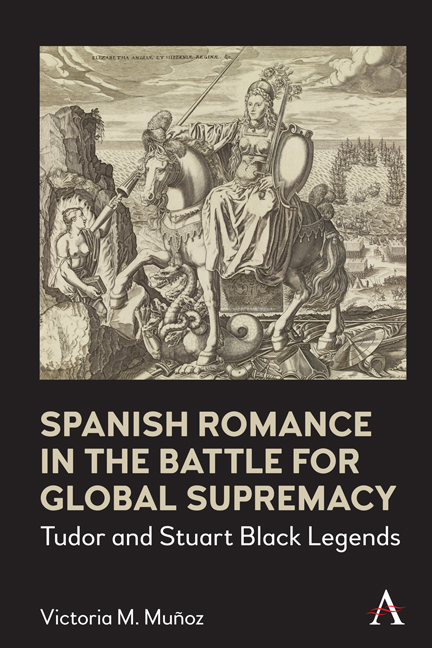Book contents
- Frontmatter
- Contents
- List of Figures
- Acknowledgments
- Prologue: Translating Romance, Empire, and Spain
- Chapter One “Books of the Brave” English: Spanish Tales of Love and Arms in Translation
- Chapter Two Dream Visions and Competing Dreams: Rewriting the Spanish Model in America
- Chapter Three Sun Kings and Moon Queens: The Courting and Uncourting of Spain
- Chapter Four Signs of England: Redcrosse Crosses the Ancient Boundary
- Chapter Five Believing Bottom’s Dream: Rationalizing Exploration from America to Australia
- Chapter Six Unruly Readers: Anti-Spanish Sentiment and the Feminizing of Romance
- Epilogue: Spanish Literature in England before Don Quixote
- Appendix I English Readership of Spanish Romance, By the Numbers
- Selected Bibliography
- Index
Prologue: Translating Romance, Empire, and Spain
Published online by Cambridge University Press: 22 February 2022
- Frontmatter
- Contents
- List of Figures
- Acknowledgments
- Prologue: Translating Romance, Empire, and Spain
- Chapter One “Books of the Brave” English: Spanish Tales of Love and Arms in Translation
- Chapter Two Dream Visions and Competing Dreams: Rewriting the Spanish Model in America
- Chapter Three Sun Kings and Moon Queens: The Courting and Uncourting of Spain
- Chapter Four Signs of England: Redcrosse Crosses the Ancient Boundary
- Chapter Five Believing Bottom’s Dream: Rationalizing Exploration from America to Australia
- Chapter Six Unruly Readers: Anti-Spanish Sentiment and the Feminizing of Romance
- Epilogue: Spanish Literature in England before Don Quixote
- Appendix I English Readership of Spanish Romance, By the Numbers
- Selected Bibliography
- Index
Summary
“Language has always been the partner to empire. So remarked the Spanish humanist and philologist, Antonio de Nebrija, to Queen Isabel I (Isabella I) of Castilla (Castile) and León (1451–1504; ruled 1474–1504) in the dedication of his 1492 Gramática de la lengua castellana. This book, the first printed grammar of a romance language, served as prologue for the mass dissemination of Spanish language and literature, and especially of Spanish vernacular romance, throughout Europe and the Americas during the sixteenth and seventeenth centuries. Paired with the activities of the Spanish and Portuguese conquistadors in the New World, these diverse romance works translated the thesis of European civility across the globe with “the prerogative of a conqueror.”
Nebrija's observation therefore corroborates the view, commonly held among translation scholars, that translation forms part of a larger project of cultural imperialism. This imperialist impulse also informed the early modern humanist program, which sought to recover lost works from the great writers of the Greek and Roman empires, in part to prepare the Christian princes of Europe for the demands of ruling. Nevertheless, this imperial reading of translation must be undertaken with care in order to avoid anachronisms, particularly in the context of Renaissance translations, which also incorporated a pluralist tradition of reading across time and space, as informed by Christian teachings. Indeed, the imperialist thesis of Renaissance translation could very easily be overstated, especially in the case of early modern Spain, where the linguistic umbrella had always been polyglot, encompassing Castilian, Catalán, Galician, Basque, Aragonese, Andalusian Arabic, and other regional dialects.
And yet, these hybridized conventions had limited impact on the political spread of Castilian during the fifteenth and sixteenth centuries as a major language of Spanish courtliness and commerce. The early modern construction of a Spanish vernacular tradition tied to the Spanish Habsburgs furthermore advanced a nascent idea of the nation prior to the emergence of nationalism as a concrete ideology, as Fernando Romo Feito explains:
The dynastic union between two peninsular kingdoms achieved by the marriage of Ferdinand II of Aragon and Isabella of Castile, their conquest of the Muslim reign of Granada, and their support of Columbus's enterprise [to America] all served to define and consolidate the spread of Castilian across and beyond the peninsula, i.e., its conversion into “Spanish.”
- Type
- Chapter
- Information
- Spanish Romance in the Battle for Global SupremacyTudor and Stuart Black Legends, pp. 1 - 10Publisher: Anthem PressPrint publication year: 2021



